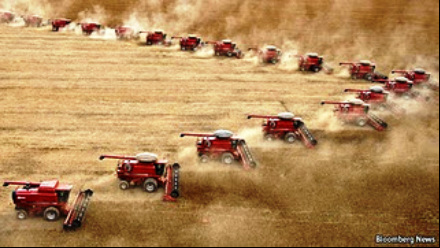 Image From: http://oilprice.com
Image From: http://oilprice.com The present worldwide system of food is dependent on transport and fuel. As all the countries of the world continue this “life on the fast lane” lifestyle, fuels are almost bound to become more expensive in the long run. This will make the present, agricultural production system that relies on fuel less secure, and food more costly. Thus, it is mandatory to market a community that is self-sufficient when it comes to food and minimize the need to use fuel in the overall food system.
Any grocery exporter with experience will be aware that the link between oil and food is systematic, and the rates of both fuel and food have gone up and gone down more or less in sync during the past few years. Contemporary agriculture makes use of oil items to keep farm machinery going, to transfer farm output to the end user (the customers) or to transfer other products into the farm. Oil is usually employed as input in the chemicals that are used in agriculture. The spikes in oil prices would therefore cause tension on all the factors of industrial food systems.
All of these happenings have caused concern that volatile and high crude oil prices may result in the prices of food getting more and more expensive as the days pass. Aside from this, as the oil prices continue to go up, so will the demand for those biofuels (liquid fuels that are not made out of fossils that can serve as substitutes for petroleum products inside motor vehicles and combustion engines).
The downside to this is that biofuels are normally created out of different agricultural products such as corn. As the typical grocery exporter will demand a lot out of these substitute fuels (along with other grocery exporters from around the globe), the prices of crops will skyrocket, resulting in food that is less affordable.
Any grocery exporter with experience will be aware that the link between oil and food is systematic, and the rates of both fuel and food have gone up and gone down more or less in sync during the past few years. Contemporary agriculture makes use of oil items to keep farm machinery going, to transfer farm output to the end user (the customers) or to transfer other products into the farm. Oil is usually employed as input in the chemicals that are used in agriculture. The spikes in oil prices would therefore cause tension on all the factors of industrial food systems.
All of these happenings have caused concern that volatile and high crude oil prices may result in the prices of food getting more and more expensive as the days pass. Aside from this, as the oil prices continue to go up, so will the demand for those biofuels (liquid fuels that are not made out of fossils that can serve as substitutes for petroleum products inside motor vehicles and combustion engines).
The downside to this is that biofuels are normally created out of different agricultural products such as corn. As the typical grocery exporter will demand a lot out of these substitute fuels (along with other grocery exporters from around the globe), the prices of crops will skyrocket, resulting in food that is less affordable.
 RSS Feed
RSS Feed